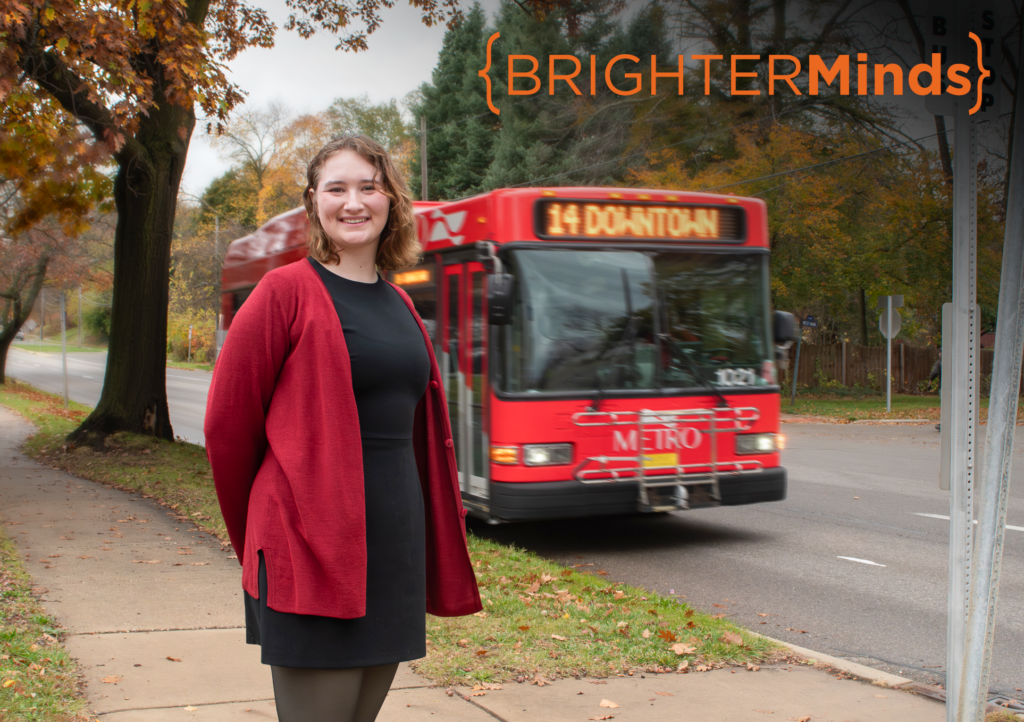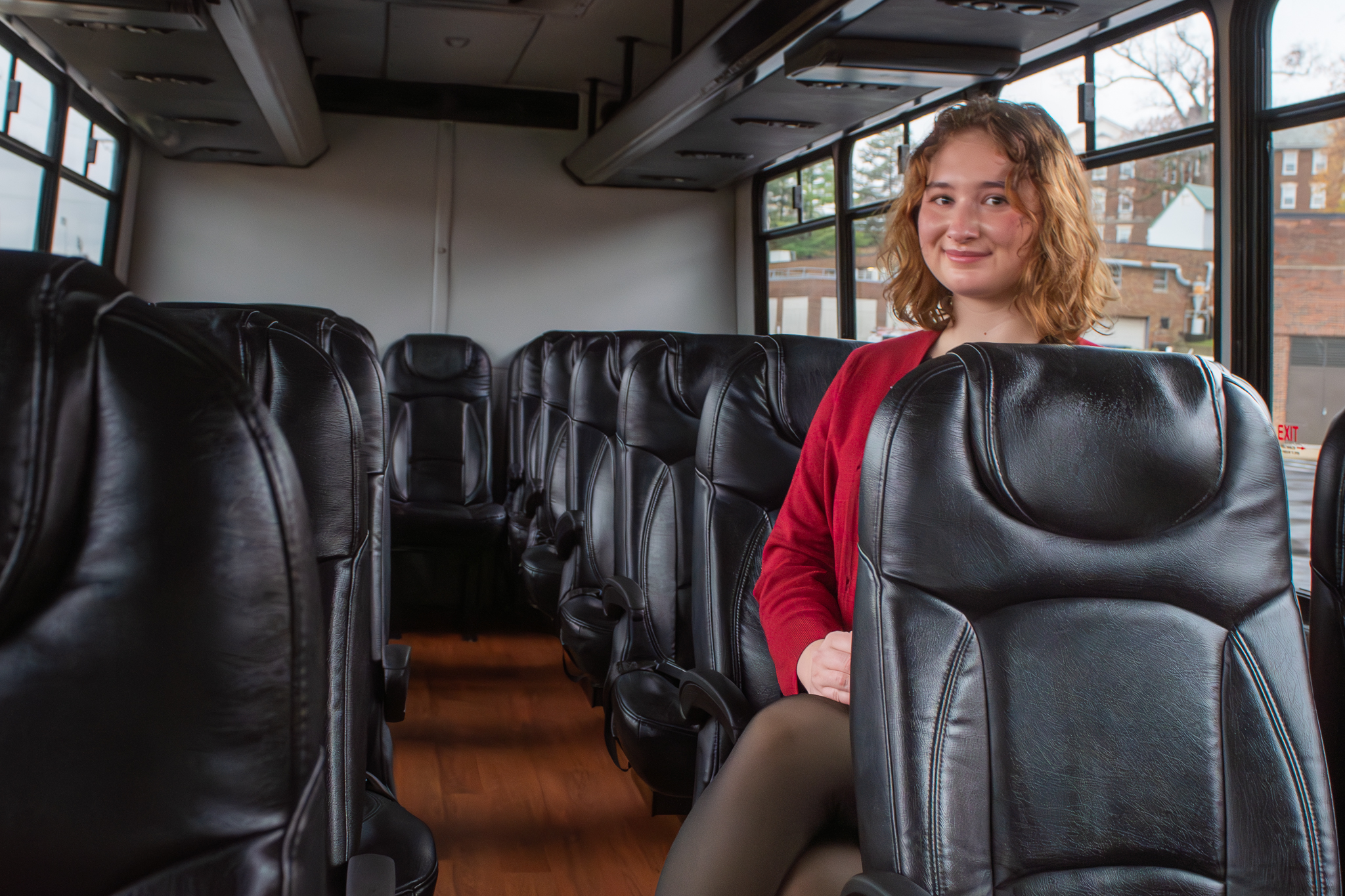
Sage Lewis ’25 hopes her research will drive movement toward sustainability in public transportation
Sage Lewis ’25 could have completed a bare bones Senior Integrated Project (SIP) on public transportation in Kalamazoo relying on affordable and accessible academic research.
However, a grant from a research endowment established as part of the Brighter Light Campaign threw open the doors to firsthand research, more academic resources, and a deeper and broader experience that benefits Lewis as well as, potentially, Kalamazoo and beyond.
Funding provided by the Richard J. Cook and Teresa M. Lahti Endowment for Undergraduate Research and Creative Activity “meant that I didn’t have to limit what I wanted to do,” Lewis said. “I had a lot of hopes and aspirations and I’m going to meet most of them because the grant allowed me to pursue my research the way I wanted and gave me a lot of freedom.”

An economics and Spanish double major with a concentration in public policy and urban affairs, Lewis tackled an economic analysis of Kalamazoo’s public transportation with a sustainability perspective for her SIP. Thanks to the Cook and Lahti grant, she was able to live in Kalamazoo in August and work directly with Metro Executive Director Sean McBride for an insider’s perspective; investigate more academic resources; and attend a virtual conference on sustainable transportation (with additional funding from the Gilchrist Economics and Business Academic Scholars Grant, established by Heather Gilchrist Campbell ’79 and Christian Campbell).
Lewis took inspiration for her SIP from an economics and climate change seminar taught by Assistant Professor of Economics Darshana Udayanganie, and from her father, who spent part of his youth in Europe and frequently complains about the lack of good public transportation in the U.S.
On study abroad in Madrid, Lewis saw for herself the importance of access to public transportation and decided to explore how the sector could become more environmentally sustainable while remaining economically feasible.
The SIP dives into possible paths forward, such as maintaining the current system, transitioning entirely to electric vehicles, switching to exclusively hybrid vehicles, or developing a mixed fleet of electric and hybrid, and analyzes each option for environmental and economic sustainability.
Udayanganie, who is Lewis’ advisor, helped her plot her approach, including how to find academic papers exploring transitions to sustainability and public transportation as well as how to organize her thoughts into literary review, analysis and recommendations. She also encouraged Lewis to apply for SIP funding.
“I was applying for it when I was in Spain, so at the time, I was feeling very distant from the College,” Lewis said. “When I heard that I received this grant, it made me feel like I’m still part of the K community. It opened up so many avenues in terms of my research and this project, and it made me feel like even the provost cared about my project and found it important that I was able to explore my project to the best of my abilities without limitations.”
The Cook and Lahti Endowment provides student stipends, specific project needs and essential student travel related to faculty-advised projects to encourage and facilitate faculty-mentored student research and creative activity.
“Dr. Darshana is encouraging of all the ideas I want to include, even though my SIP is not the same as when I sent the proposal; it changes and it grows,” Lewis said. “However it evolves, she supports it. I think she just wants me to be the best I can be.”
From her SIP, Lewis has learned that while the transportation sector’s impact on the environment is even more substantial than she thought, reducing the amount of pollution caused by public transportation faces serious hurdles in bureaucracy and economic feasibility.
In Kalamazoo, she said, the transportation department is working to make improvements, but because of the economic cost, change comes slowly—not at a rate that would prevent further environmental damage and pollution. Lewis hopes her analysis will support the recommendations she wants to make to the department. She also has talked with Udayanganie about possibly continuing her research and publishing it as an academic paper.
In the future, she hopes to pursue employment and possibly graduate school in public policy or a related field, and to use that work to shape a better world.
Her K experiences, including jobs in the Office of Student Activities, as a First Year Experience Mentor, and as a teaching assistant and departmental student advisor; founding and serving as president of Art Club; and working on her SIP, have taught Lewis that when she commits to her goals, nothing can stop her, and that her efforts are appreciated.
“That’s why I want to go into public policy, because I could continue making those differences for the world through policymaking,” Lewis said. “I’m passionate about so many different things, and I can excel in all of them. I’m not defined by my major or the main interests I have as a person. We’re all interested in so many different things, and K encourages you to pursue that and find who you are as a well-rounded individual.”
